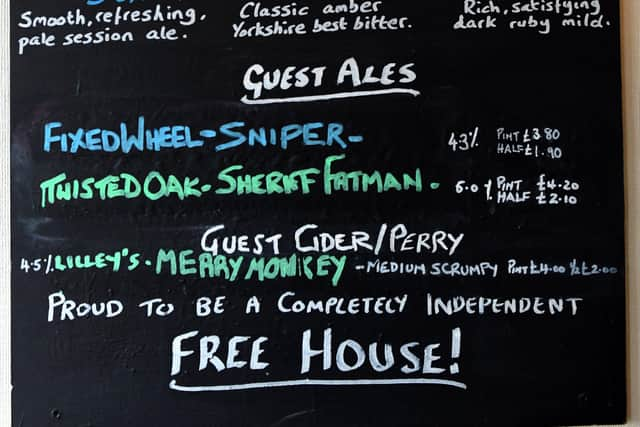Cheers to 10 years of the York pub that beat Thatcher’s ‘beer orders’


The Slip Inn, just across Skeldergate Bridge from Clifford’s Tower in York, was rescued from likely closure when its previous owner, one of the “big six” national pub companies, put it on the market.
The businessman who now runs it said it was making three times as much money as before, and accused the industry giants of maintaining a “power imbalance” that had caused the closure of up to 52 pubs a week across the country.
Advertisement
Hide AdAdvertisement
Hide AdPaul Crossman, who also runs The Swan, 70 yards away on Bishopgate Street, and is on the steering group of the British Pub Confederation, which represents independent publicans, said the future for many hostelries lay in ownership by the local community.


“Several hundred communities have bought their pubs and not one of those pubs has failed,” he said.
But he accused politicians of lacking the will to reform what he said was the anachronism of large pub companies being allowed to exercise a disproportionate influence on trade prices.
“All the other arguments about keeping pubs open pale into insignificance compared to the stranglehold that the big brewers and pub companies have over the market. It’s absolutely one of the chief problems facing the industry and causing the closure of so many pubs,” he said.
Advertisement
Hide AdAdvertisement
Hide AdMr Crossman, who writes in the opinion pages of The Yorkshire Post today, had previously run The Swan on a “tied house” arrangement with a brewery, and freed himself from it only after a protracted legal battle.
“When I was tied, I had to buy from their limited supply list and pay their prices, which were totally nonnegotiable and at that time 90 to 100 per cent more than market prices,” he said.
“As a tenant, you can’t negotiate on price and you can’t select your own products, yet you’ve got all the obligations that come with being a freeholder – you maintain the building, you’re responsible for taxes and compliance, but your profit margin is slashed because you’re paying so much more for the beer. And you can’t stock the kind of things that the modern market requires.”
He said The Slip, which sells beer but not food, had been neglected by its former owners, who “weren’t interested in back street pubs any more” and preferred to build new pub-restaurants on ring road roundabouts.
Advertisement
Hide AdAdvertisement
Hide Ad“It had a long-standing tenant in there and we arranged to get her though to retirement, then we bought the business from her. The pub company could have done that but they weren’t interested,” Mr Crossman said.
“We spruced it up, made the accommodation better to attract a decent manager and put a range of independent beer on the bar. It wasn’t rocket science but in the first few months we tripled the previous trade.”
The anniversary, at a time of mass closures across the country that hit a peak during the 2008 financial crash, felt “like an act of political defiance”, he added.
“I’m proud that we’ve done something really important for the community. We’ve got a thriving independent pub that’s fully engaged with the community and also happens to be quite good business.”
Advertisement
Hide AdAdvertisement
Hide Ad• The so-called “Beer Orders” which placed many pubs in the hands of a few large companies was a compromise born in 1988 of Margaret Thatcher’s desire to force the large brewers who between them owned nearly half the nation’s pubs, to diversify.
But the legislation made two of the new companies, Punch Taverns and Enterprise Inns, bigger than the six put together.
At one point, more than half of all pubs were owned under the leased system created by the Beer Orders. They were revoked in 2003, but their impact is still felt across the industry.
Paul Crossman at The Slip in York, said: “I find it astonishing that it hasn’t been dealt with. There’s just no political will.”